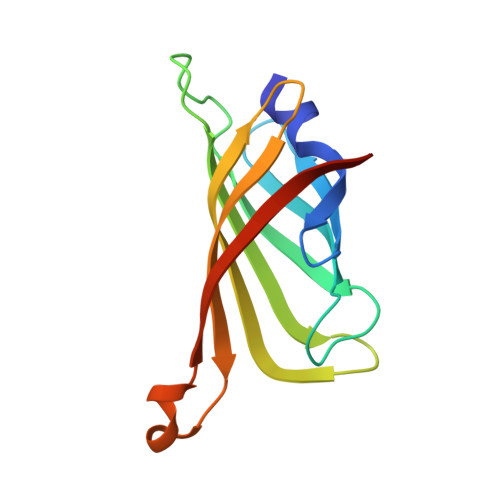Structure-based design of a streptavidin mutant specific for an artificial biotin analogue.
Kawato, T., Mizohata, E., Shimizu, Y., Meshizuka, T., Yamamoto, T., Takasu, N., Matsuoka, M., Matsumura, H., Kodama, T., Kanai, M., Doi, H., Inoue, T., Sugiyama, A.(2015) J Biochem 157: 467-475
- PubMed: 25645976
- DOI: https://doi.org/10.1093/jb/mvv004
- Primary Citation of Related Structures:
3WZN, 3WZO, 3WZP, 3WZQ - PubMed Abstract:
For a multistep pre-targeting method using antibodies, a streptavidin mutant with low immunogenicity, termed low immunogenic streptavidin mutant No. 314 (LISA-314), was produced previously as a drug delivery tool. However, endogenous biotins (BTNs) with high affinity (Kd < 10(-10) M) for the binding pocket of LISA-314 prevents access of exogenous BTN-labelled anticancer drugs. In this study, we improve the binding pocket of LISA-314 to abolish its affinity for endogenous BTN species, therefore ensuring that the newly designed LISA-314 binds only artificial BTN analogue. The replacement of three amino acid residues was performed in two steps to develop a mutant termed V212, which selectively binds to 6-(5-((3aS,4S,6aR)-2-iminohexahydro-1H-thieno[3,4-d]imidazol-4-yl)pentanamido)hexanoic acid (iminobiotin long tail, IMNtail). Surface plasmon resonance results showed that V212 has a Kd value of 5.9 × 10(-7) M towards IMNtail, but no binding affinity for endogenous BTN species. This V212/IMNtail system will be useful as a novel delivery tool for anticancer therapy.
Organizational Affiliation:
Division of Applied Chemistry, Graduate School of Engineering, Osaka University, 2-1 Yamadaoka, Suita, Osaka 565-0871, Japan; Graduate School of Pharmaceutical Sciences, The University of Tokyo, Hongo, Bunkyo-ku, Tokyo 113-0033, Japan; Research Center for Advanced Science and Technology, The University of Tokyo, Tokyo 153-8904, Japan; and Radioisotope Center, The University of Tokyo, 2-11-16 Yayoi, Bunkyo-ku, Tokyo 113-0032, Japan.
















